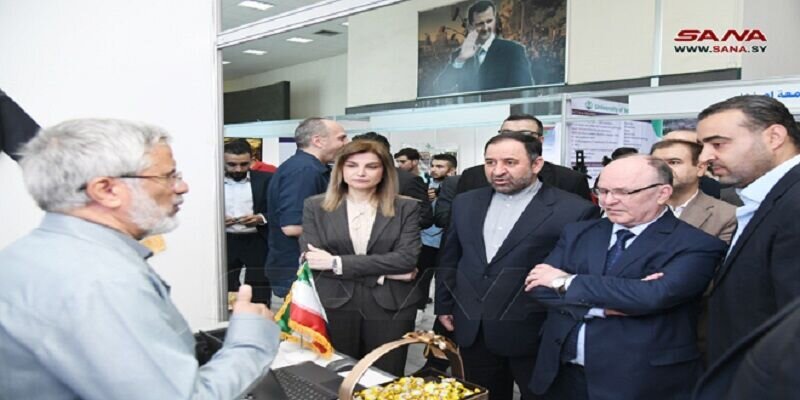Damascus exhibiting capabilities of Iranian universities

TEHRAN –An exhibition showcasing the scientific capabilities of Iranian universities is being held in Damascus, Syria.
A total of 13 Iranian universities are attending the four-day event, which kicked off today at the Faculty of Law at the University of Damascus, IRNA reported.
The national union of Syrian students, in cooperation with Iran's vice-presidency for science and technology, has organized the exhibition within the framework of scientific cooperation between Syria and Iran to feature the scientific capabilities of Iranian universities.
Bassam Bashir Ibrahim, the Minister of Higher Education and Scientific Research of Syria, visiting the exhibition underscored the importance of utilizing the experiences and expertise of the universities present in the exhibition.
The Syrian official said, “Holding such exhibitions can provide Syrian students an opportunity to explore the services provided by these universities, including the educational systems, curriculums, tuition fees, and registration processes.”
Iran’s ambassador to Damascus, Hossein Akbari, for his part said, “Universities play an essential role in the development of technology which consequently has a significant impact on the fate of any country.”
This exhibition displays only a small part of the scientific capabilities of Iranian universities, the official highlighted.
“Iran and Syria need to further expand sci-tech ties to be able to neutralize oppressive sanctions imposed by enemies,” Akbari added.
Science, technology co-op
The Iranian deputy science minister, Vahid Haddadi-Asl, and the representative of the Syrian Higher Education Ministry, Fadia Yousef Deeb, discussed ways to enhance bilateral scientific research cooperation.
The meeting was held on December 18, 2023, within the framework of the first joint science and technology cooperation committee, attended by a Syrian delegation and representatives of Iran’s ministries of science and health.
Referring to the friendly relations between the two countries, Haddadi-Asl considered it necessary to develop and deepen scientific cooperation in the international arena, IRIB reported.
Collaboration in the fields of education, research, technology, and student exchange were among the important topics of discussion.
Yousef Deeb, for her part, acknowledging the capabilities of Iran in scientific developments, announced Syria’s readiness for scientific cooperation with Iran; she also stressed the importance of Iran's scientific experiences being shared with Syria.
She asked for a report on the process of establishing science and technology parks and the possibility of training Syrian science and technology managers in Iran or Syria.
Concerning Syria’s interest in enhancing technological and innovative cooperation with Iran, the deputy science minister for innovation and technology, Sajjad Mohammad-Ali Nejad, presented an account of the status of science and technology parks in Iran and the different stages of their establishment, including entrepreneurship centers in universities, technology incubators, which are responsible for training technicians to work in knowledge-based companies, and technology campus.
He went on to explain that, “Iran has managed to establish and expand science and technology parks without relying on other countries, and is willing to share its knowledge and experiences with Syria.”
In December 2023, Mohammad-Reza Mohammadzadeh Attar, the Iranian Deputy Science, Research, and Technology Minister; and Mohamad Amer Tlas, the Syrian Vice-President for the National Union of Students, in a meeting in Tehran, discussed ways to enhance scientific and technological cooperation.
The necessity of establishing a joint science and technology park in Syria was highlighted.
The officials also agreed to hold an exhibition of Iran’s scientific achievements in Syria to make Syrian students acquainted more with the technologies and innovations of Iran and Iranian universities.
Syrian students who are interested in studying in Iran will be granted scholarships for master's and Ph.D. degrees.
It was also decided to strengthen Persian language courses in Syria by dispatching professors from Iran
MT/MG
